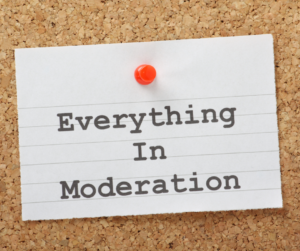All
Moderation has never been my thing. When I was learning to juggle, I spent hours, days, and weeks perfecting the pitch and catch sequence with balls, hacky-sacks, fruits, and even eggs. No matter how many bad throws I made, I worked until I could make consistent tosses. After homework, I could be found outside, spastically reaching and sprinting in circles, desperate to master the skill of juggling.
Softball produced the same all or nothing momentum. Even when no one played with me, I could be found in the backyard playing catch with myself over the clothesline, throwing the ball at a target against the wooden fence, tossing the ball into the air and hitting it, or throwing a ball on the roof and catching it with my glove. I rarely missed a team practice and for several years, I played on three different softball teams. Softball was my life.
Nothing
Eleventh grade happened. Drum major. Newspaper staff. Church activities. Honor society. Beta Club. And trigonometry. My high school self was well acquainted with rigorous class work; after all, college was on the horizon. But trig was more than my uninterested, overcommitted self could handle. As the work became harder, I refused to ask for help. Asking for help was a sign of weakness. Instead, I started sleeping in class. My best friend slept and made A’s, surely my luck would be like hers. By the end of the course, I was three-tenths of a point away from failing the class and my “nothing” attitude almost put a halt to my academic progression.
 The other part about being on the nothing side of the pendulum is forgetting commitments. Once I moved into the young adult world, my well-intentioned mouth engaged before my unmotivated heart committed and I became a yes person. A yes person who only showed up half the time because I was overcommitted and there was zero prioritizing, scheduling, or planning on my part. The nothing side of all or nothing left people hanging and jobs undone. Important ones. I was a great starter on the “all” side of things, but never a finisher as I landed on the nothing side.
The other part about being on the nothing side of the pendulum is forgetting commitments. Once I moved into the young adult world, my well-intentioned mouth engaged before my unmotivated heart committed and I became a yes person. A yes person who only showed up half the time because I was overcommitted and there was zero prioritizing, scheduling, or planning on my part. The nothing side of all or nothing left people hanging and jobs undone. Important ones. I was a great starter on the “all” side of things, but never a finisher as I landed on the nothing side.
Active Listening
“Christy. You’re not even listening to me. What did I say?” My friend’s direct words pulled me out of a distant place in my head.
“I was listening.”
“No, you weren’t. I need you to pay attention. Friends actually listen.”
She was right. I was thinking about all the stuff I needed to accomplish, how I was going to respond to her words, where I was going after work, and everything else but listening to her very important side of the conversation about a struggle she was experiencing.
Later, in a college class, I learned about active listening. In my all or nothing world, being present wasn’t something that happened much, so actively, intentionally listening to a person was a skill I needed to add to my repertoire.
Active listening also involved watching body language, mannerisms, hearing tones, and reading emotions through the words and phrases. Not overanalyzing. Instead, caring. Paying attention. Sincerely getting to know the other person. Skills I desperately needed to master if I was going to learn moderation.
Moderation
Moderation means no extremes. In the middle. It’s not all or nothing, but some foreign gray place filled with calm commitment and careful consideration. Projects are started. And projects are finished. Friendships are started. And friendships continue. There is longevity involved. Depth. Wisdom. Thought.
I think of King David in 1 Chronicles, 17:1-4 (CSB). “When David had settled into his palace, he said to the prophet Nathan, ‘Look! I am living in a cedar house while the ark of the Lord’s covenant is under tent curtains.’ So Nathan told David, “Do all that is on your mind, for God is with you.” But that night the word of God came to Nathan: ‘Go to David my servant and say, ‘This is what the Lord says: You are not the one to build me a house to dwell in.’”
 Now, David had two options. He could throw his king card, continue on the path he was headed, and build the temple without heeding Nathan’s warning from the Lord. He could be all in.
Now, David had two options. He could throw his king card, continue on the path he was headed, and build the temple without heeding Nathan’s warning from the Lord. He could be all in.
Or he could heed the instruction from the Lord and allow his son, Solomon, to complete the task. This second option would mean backing up and looking at the situation through eyes of humility. Recognizing that temple building wasn’t God’s plan for David and then being okay with that decision.
Good Things and God Things
Contrary to popular belief, living for Jesus is not an all or nothing decision. Yes, when we surrender to him for the first time through salvation, we give him our all, but every decision after that requires careful consideration.
As a believer, good things pop up all the time—like David wanting to build the temple. His motives were right. The idea was noble. This definitely fell in the good thing to do category.
But good things and God things aren’t the same. Building the temple was actually a God thing, just not for King David—but for Solomon, David’s son. God knew Solomon was the best fit for the job, even though David’s heart was in the right place. Every good thing we find to do isn’t always the God thing God has for us to accomplish.
Moderation and Christ
Even Jesus didn’t try and do all the things. Often, he pulled away to pray and be alone with his father. He sent the disciples out to share the Good News throughout the various regions. So often, he allowed someone else to complete a task that could have been done by him.
Why? Because all good things are not ‘God things’ for that specific person. We must examine. Listen. Pray. Apply Wisdom. And seek the Lord. David had no business doing a task God intended for Solomon. And we have no business completing a job that is designed for another believer.
 As hard as moderation is, it is the way of Christ. And if we will slow down and truly go where he wants us—oh the blessings we’ll experience.
As hard as moderation is, it is the way of Christ. And if we will slow down and truly go where he wants us—oh the blessings we’ll experience.
“The person who trusts in the LORD, whose confidence indeed is the LORD, is blessed.” Jeremiah 17:7 (CSB)
© Christy Bass Adams, August 2023
All images from Canva




“Good things and God things” — a great phrase to remember. Thank you, Christy.